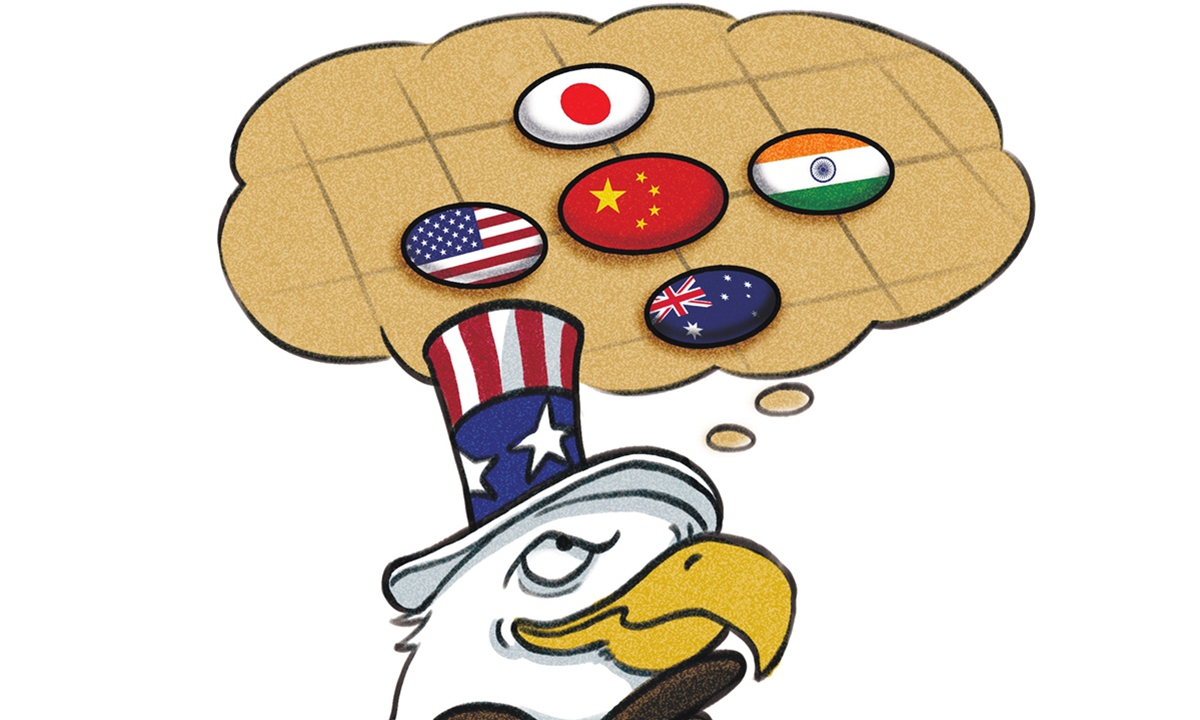
Illustration: Liu Rui/GT
The third ministerial meeting among Quad, an informal security grouping of the US, Japan, Australia and India, was held online on Thursday morning US local time. What is the aim? Quite a few Western media put it bluntly before the meeting started: to balance China's growing power and "out-compete" Beijing. However, no joint statement has been issued. Again, Quad members issued their separate press release of the event without naming China.
This is the perfect time to recall the last Quad ministerial meeting in October 2020, when former US secretary of state Mike Pompeo personally attended it in Tokyo. There was also not even a joint statement, as the four member states couldn't reach a consensus on anything directed against China.
What former US president Donald Trump failed to achieve won't be accomplished by Joe Biden either. Washington made no fruitful results regarding the Quad during Trump's tenure. This was not because Trump's attitude or approaches were wrong. Instead, it reflects the fact that other countries were less interested in promoting the bloc as the US did. It is the same today.
As the entire world continues to face a common threat from COVID-19, it is not rational to stand by the US, which handled the coronavirus terribly, to directly or indirectly gang up on China, the country that has made the greatest contribution to the fight against the public health crisis. The US cannot even promote sufficient consensus over the case in Quad members.
Others won't be enchanted by the US now, or profoundly change their stances just because of Biden's softer voice or greater charm. This is a matter of consideration over each country's national interests based on rational calculations.
How can Japan, India and Australia acquire benefits from devoting themselves to boosting the Quad? There are two ways. First, China is a juicy low-hanging fruit, a pushover which has the potential to hand over huge profits when being bullied. Second, the US could make tempting offers to those countries that they find hard to refuse. Unfortunately, neither of the two scenarios is realistic.
Japan has just signed the Regional Comprehensive Economic Partnership agreement with China. India is mulling over the idea to ease restrictions on investment from China, as the country is mired in a pandemic-induced economic recession. Australia is putting all its eggs into one US basket in terms of China policy. Yet the US can hardly replace China to digest all Australian exports to China. Does the US need that much Australian iron ore or does the US have that many steel mills?
During the Quad's initial stage, it seemed a serious play was in motion. But it has already become a farce now. It runs counter to this era of multilateral global engagement. We are no longer living in the Cold War. Promoting a quasi-alliance like the Quad will only make people feel they are living in an anachronistic world.
The new US government is eagerly promoting the Quad within the first month after assuming office; simply because the Biden administration is anxious to make good scores to safeguard its own defensive line amid US political infighting which has been re-stimulated by Trump.
Look at how many people viewed Biden's Presidents Day speech on Monday. Compare that with how many more Trump's supporters gathered near his Mar-a-Lago home, cheering for Trump on the same day. The 2022 US Congress elections are approaching. The new administration is running out of time to do something.
Trump was acquitted twice in his impeachment trials, leaving Biden no more chances to knock him or his influence down in the foreseeable future. Now the new administration has to turn to the easiest way to make itself look good. Repairing frayed ties with allies, retuning to multilateralism, and lifting US leadership are tactics. So is promoting the Quad.
The main function of Thursday's meeting is to collect one more group photo for the US. The conference will be convened. But again, it can be certain there won't be substantive achievement. Diplomacy has two major parts: procedures and content. Since Biden is expected to adjust Trump's diplomatic tactics, the West's confidence toward Washington will rebound and seemingly get closer to the US in terms of procedures.
But Western countries, as well as Quad members, are well aware (maybe more aware than China is) of the severe domestic problems in the US. Even if Biden is a truly capable leader, he will only be in the post for eight years at most. No one knows where the future situation of the US is headed. No rational strategist will unconditionally and completely take the US side at once.
It is quite different between a Chinese leader attending a meeting and a US leader doing the same. The Chinese side will always bring up substantial progress and outcome. But for US politicians, a hollow joint statement, or even just a group photo could be remarkable enough.
Eventually people will ask the question: Can the US, which cannot even put forward a joint statement for Quad meeting, form a larger camp like the Global Democracy Summit? Apparently, the Biden administration needs to make more practical changes to turn the tide.
The author is professor at the School of International Relations and Public Affairs of Fudan University. opinion@globaltimes.com.cn




